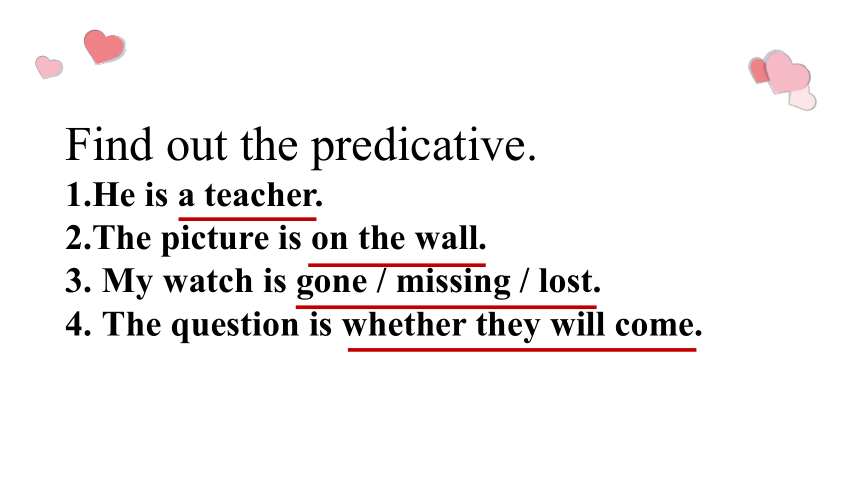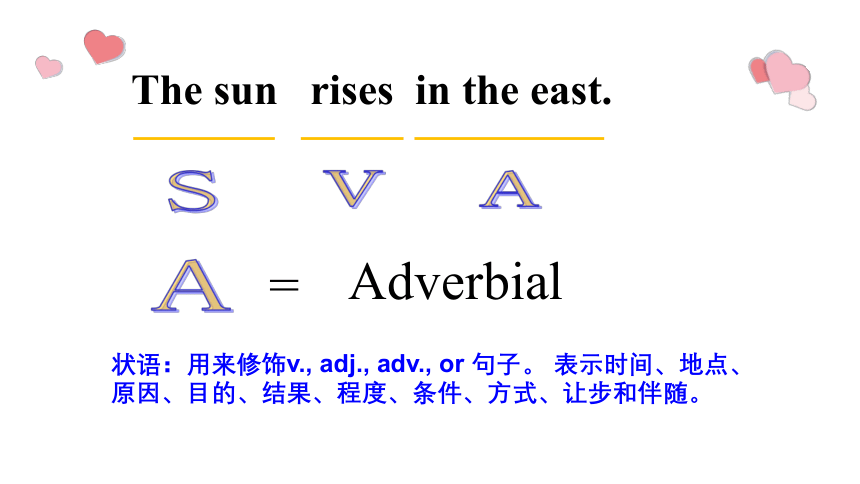Unit 4 Problems and advice Grammar课件
文档属性
| 名称 | Unit 4 Problems and advice Grammar课件 |

|
|
| 格式 | pptx | ||
| 文件大小 | 1.3MB | ||
| 资源类型 | 试卷 | ||
| 版本资源 | 牛津深圳版 | ||
| 科目 | 英语 | ||
| 更新时间 | 2022-10-25 16:49:59 | ||
图片预览









文档简介
(共28张PPT)
Problems and Advice
Grammar
Unit 4
The sun rises.
S
V
S
=
Subject (句子说明的人或物)
=
Verb (说明主语的动作、状态)
V
Find out the subject and verb.
1.I like China.
2.He hates you.
3.What he needs is a book.
4. I hope to see you again.
The sun is beautiful.
S
V
P
P
=
表语用来说明主语的身份、性质、品性、特征和状态, 常常位于系动词之后。
Predicative
Find out the predicative.
1.He is a teacher.
2.The picture is on the wall.
3. My watch is gone / missing / lost.
4. The question is whether they will come.
The sun rises in the east.
S
V
A
A
=
Adverbial
状语:用来修饰v., adj., adv., or 句子。 表示时间、地点、原因、目的、结果、程度、条件、方式、让步和伴随。
III. Read the sentences and underline the two adverbials in each sentence.
1. Prince Charles opened a new sports centre in Stoke yesterday
2. He also spoke with several young people.
3. The sports centre was first planned in 1994.
4. Naturally, the local council could not finance the project without help.
5. Luckily, they managed to get money from the National Lottery.
I saw the sun.
S
V
o
o
=
Object
宾语:动作的承受者。
Find out the object.
1. We should help the old and the poor.
2. I enjoy working with you.
3. Did you write down what he said
4. Are you afraid of the snake
I saw the sun rising.
S
V
o
c
C
=
Complement
宾补:对宾语的补充,全称为宾语补足语。
We’re having a great time.
The weather is fine.
We really enjoy camping.
It’s great fun.
We saw many sheep on the farm.
We like this place.
Let’s make the world more beautiful.
I. Think and tell which sentence element the underlined part is.
O
S
V
C
A
O
C
I smile.
The braces hurt my teeth.
I feel embarrassed.
She is driving me mad.
5. I saw a sick lady two days ago.
6. I am studying at home.
(S+V)
(S+V+O)
(S+V+C/P)
(S+V+O+C)
(S+V+O+A)
(S+V+A)
1. Sentences in English usually have a subject (S) and a verb (V).
英语句子通常有一个主语(S)和一个谓语(V)。
谓语表示动作。
主语表示动作的发出者,即发出动作的人或物。
2. Some sentences also have an object (O).
有些句子含有宾语。
宾语是动作的接受者,表示承受动作的人或物。
3. Sentences with verbs such as give, bring, buy and send can have a
direct object (DO) and an indirect object (IO).
句子的谓语动词是give, bring, buy, send时,后面可接两个宾语:直接宾语(DO)和间接宾语(IO)。
直接宾语指被接受的东西。
间接宾语是接受东西的人。
Things to remember
When the indirect object comes after the direct object, to or for is used.
The braces have brought so much trouble to me.
S V DO IO
当间接宾语位于直接宾语后时,需要加上to或for。
下列动词后用to:bring,feed,give,hand,lend,offer,pass,pay,post,sell,send,show,take,teach,tell,write, promise, return。
下列动词后用for:book,buy,choose,cook,fetch,leave,make,order,pick,reserve,save, call, draw, find, get, sing, save, spare。
Give these papers ______ my secretary.
Could you make some coffee ______ me
Book a flight ______ me, will you
Can you post this cheque ______ the hotel
Don’t show these plans ______ anyone.
Leave a message ______ my secretary.
Fetch the file ______ me, will you
Write a memo ______ all the managers.
IV. Fill in the correct prepositions.
to
for
for
to
to
for
for
to
Some sentences have a linking verb followed by a
complement (C).
有些含有连系动词的句子中,连系动词不能表达完整的意思,必须加上表明主语身份或状态的补语(C)(又叫表语),才能表达完整的意思。
连系动词
主语补足语
(补充说明主语)
Some sentences have an object followed by a complement (C).
有些句子的动词只跟一个宾语不能表达完整的意思,必须加上补语(C)才能表达完整的意思。
宾语补足语
(补充说明宾语)
Things to remember
Verbs such as find, keep and make often use the above pattern.
I try to keep the room tidy.
She makes me angry.
find, keep和make常常使用S + V + C(主语+连系动词+主语补足语),或S + V + O + C(主语+谓语+宾语+宾语补足语)这两种形式。
5 Some sentences have an adverbial (A).
有些句子含有状语(A)。
状语表示时间,地点等。
II. Read the sentences and match them with the sentence structures.
S + V
S + V + O
S + V + O + C
S + V + A
S + V + IO + DO
That job drove me crazy.
I agree.
She will come at 10 p.m.
I had some meat.
I’ve made you some more tea.
Mike: Why is everyone laughing (a funny story/us)
Vicky: Daniel told _______________________.
Alex: There’s some fish left over. (it/the cat)
Laura: I’ll feed ___________.
Mark: What are you doing with those bottles (them/the hotel)
Sarah: I’m taking _______________.
Jim: How are things with you, Daniel (a job/me)
Daniel: Fine. Someone has offered __________.
David: What did you do with those papers you found (them/the police)
Tom: Oh, I handed _______________.
Emma: Look! It’s pouring with rain. (my umbrella/you)
Rachel: It’s OK. I’ll lend __________________.
V. Fill in the blanks with the correct forms of the given words.
us a funny story/ a funny story to us
it to the cat
them to the hotel
me a job /a job to me
them to the police
you my umbrella/my umbrella to you.
Tom is a junior high school student.(Tom, junior high school student, be) He ________________
______________________. (best friends, visit, every weekend) One of them is a boy called Alex.
visits his best friends every weekend
Look at the pictures plete the sentences with the words in brackets. Add other words if necessary.
Grammar exercise
Last weekend, _______________________
____________________. (Alex, some new
books, showed, Tom, in his flat) Suddenly
Alex knocked a flowerpot out of his window
by accident. This___________________.
(them, made, worried)
Alex showed some new books to Tom in his flat
made them worried
Luckily, no one was hurt by the flowerpot.
Then______________________________.
(for, went out, an hour, Alex and Tom)
Alex and Tom went out for an hour
Alex and Tom ____________________________.
(later that afternoon, returned) They saw a
policeman questioning a boy about the broken
flowerpot. They ____________ (very bad, felt), but they did not know what to do.
returned later that afternoon
felt very bad
Translation
我担心我的妈妈。
I am worried about my mother.
2. 他感到尴尬。
He feels embarrassed.
3. Tom 看见他正在打篮球。
Tom saw him playing basketball.
4. 我很后悔对我妈妈撒了谎。
I regretted lying to my mum.
Problems and Advice
Grammar
Unit 4
The sun rises.
S
V
S
=
Subject (句子说明的人或物)
=
Verb (说明主语的动作、状态)
V
Find out the subject and verb.
1.I like China.
2.He hates you.
3.What he needs is a book.
4. I hope to see you again.
The sun is beautiful.
S
V
P
P
=
表语用来说明主语的身份、性质、品性、特征和状态, 常常位于系动词之后。
Predicative
Find out the predicative.
1.He is a teacher.
2.The picture is on the wall.
3. My watch is gone / missing / lost.
4. The question is whether they will come.
The sun rises in the east.
S
V
A
A
=
Adverbial
状语:用来修饰v., adj., adv., or 句子。 表示时间、地点、原因、目的、结果、程度、条件、方式、让步和伴随。
III. Read the sentences and underline the two adverbials in each sentence.
1. Prince Charles opened a new sports centre in Stoke yesterday
2. He also spoke with several young people.
3. The sports centre was first planned in 1994.
4. Naturally, the local council could not finance the project without help.
5. Luckily, they managed to get money from the National Lottery.
I saw the sun.
S
V
o
o
=
Object
宾语:动作的承受者。
Find out the object.
1. We should help the old and the poor.
2. I enjoy working with you.
3. Did you write down what he said
4. Are you afraid of the snake
I saw the sun rising.
S
V
o
c
C
=
Complement
宾补:对宾语的补充,全称为宾语补足语。
We’re having a great time.
The weather is fine.
We really enjoy camping.
It’s great fun.
We saw many sheep on the farm.
We like this place.
Let’s make the world more beautiful.
I. Think and tell which sentence element the underlined part is.
O
S
V
C
A
O
C
I smile.
The braces hurt my teeth.
I feel embarrassed.
She is driving me mad.
5. I saw a sick lady two days ago.
6. I am studying at home.
(S+V)
(S+V+O)
(S+V+C/P)
(S+V+O+C)
(S+V+O+A)
(S+V+A)
1. Sentences in English usually have a subject (S) and a verb (V).
英语句子通常有一个主语(S)和一个谓语(V)。
谓语表示动作。
主语表示动作的发出者,即发出动作的人或物。
2. Some sentences also have an object (O).
有些句子含有宾语。
宾语是动作的接受者,表示承受动作的人或物。
3. Sentences with verbs such as give, bring, buy and send can have a
direct object (DO) and an indirect object (IO).
句子的谓语动词是give, bring, buy, send时,后面可接两个宾语:直接宾语(DO)和间接宾语(IO)。
直接宾语指被接受的东西。
间接宾语是接受东西的人。
Things to remember
When the indirect object comes after the direct object, to or for is used.
The braces have brought so much trouble to me.
S V DO IO
当间接宾语位于直接宾语后时,需要加上to或for。
下列动词后用to:bring,feed,give,hand,lend,offer,pass,pay,post,sell,send,show,take,teach,tell,write, promise, return。
下列动词后用for:book,buy,choose,cook,fetch,leave,make,order,pick,reserve,save, call, draw, find, get, sing, save, spare。
Give these papers ______ my secretary.
Could you make some coffee ______ me
Book a flight ______ me, will you
Can you post this cheque ______ the hotel
Don’t show these plans ______ anyone.
Leave a message ______ my secretary.
Fetch the file ______ me, will you
Write a memo ______ all the managers.
IV. Fill in the correct prepositions.
to
for
for
to
to
for
for
to
Some sentences have a linking verb followed by a
complement (C).
有些含有连系动词的句子中,连系动词不能表达完整的意思,必须加上表明主语身份或状态的补语(C)(又叫表语),才能表达完整的意思。
连系动词
主语补足语
(补充说明主语)
Some sentences have an object followed by a complement (C).
有些句子的动词只跟一个宾语不能表达完整的意思,必须加上补语(C)才能表达完整的意思。
宾语补足语
(补充说明宾语)
Things to remember
Verbs such as find, keep and make often use the above pattern.
I try to keep the room tidy.
She makes me angry.
find, keep和make常常使用S + V + C(主语+连系动词+主语补足语),或S + V + O + C(主语+谓语+宾语+宾语补足语)这两种形式。
5 Some sentences have an adverbial (A).
有些句子含有状语(A)。
状语表示时间,地点等。
II. Read the sentences and match them with the sentence structures.
S + V
S + V + O
S + V + O + C
S + V + A
S + V + IO + DO
That job drove me crazy.
I agree.
She will come at 10 p.m.
I had some meat.
I’ve made you some more tea.
Mike: Why is everyone laughing (a funny story/us)
Vicky: Daniel told _______________________.
Alex: There’s some fish left over. (it/the cat)
Laura: I’ll feed ___________.
Mark: What are you doing with those bottles (them/the hotel)
Sarah: I’m taking _______________.
Jim: How are things with you, Daniel (a job/me)
Daniel: Fine. Someone has offered __________.
David: What did you do with those papers you found (them/the police)
Tom: Oh, I handed _______________.
Emma: Look! It’s pouring with rain. (my umbrella/you)
Rachel: It’s OK. I’ll lend __________________.
V. Fill in the blanks with the correct forms of the given words.
us a funny story/ a funny story to us
it to the cat
them to the hotel
me a job /a job to me
them to the police
you my umbrella/my umbrella to you.
Tom is a junior high school student.(Tom, junior high school student, be) He ________________
______________________. (best friends, visit, every weekend) One of them is a boy called Alex.
visits his best friends every weekend
Look at the pictures plete the sentences with the words in brackets. Add other words if necessary.
Grammar exercise
Last weekend, _______________________
____________________. (Alex, some new
books, showed, Tom, in his flat) Suddenly
Alex knocked a flowerpot out of his window
by accident. This___________________.
(them, made, worried)
Alex showed some new books to Tom in his flat
made them worried
Luckily, no one was hurt by the flowerpot.
Then______________________________.
(for, went out, an hour, Alex and Tom)
Alex and Tom went out for an hour
Alex and Tom ____________________________.
(later that afternoon, returned) They saw a
policeman questioning a boy about the broken
flowerpot. They ____________ (very bad, felt), but they did not know what to do.
returned later that afternoon
felt very bad
Translation
我担心我的妈妈。
I am worried about my mother.
2. 他感到尴尬。
He feels embarrassed.
3. Tom 看见他正在打篮球。
Tom saw him playing basketball.
4. 我很后悔对我妈妈撒了谎。
I regretted lying to my mum.
